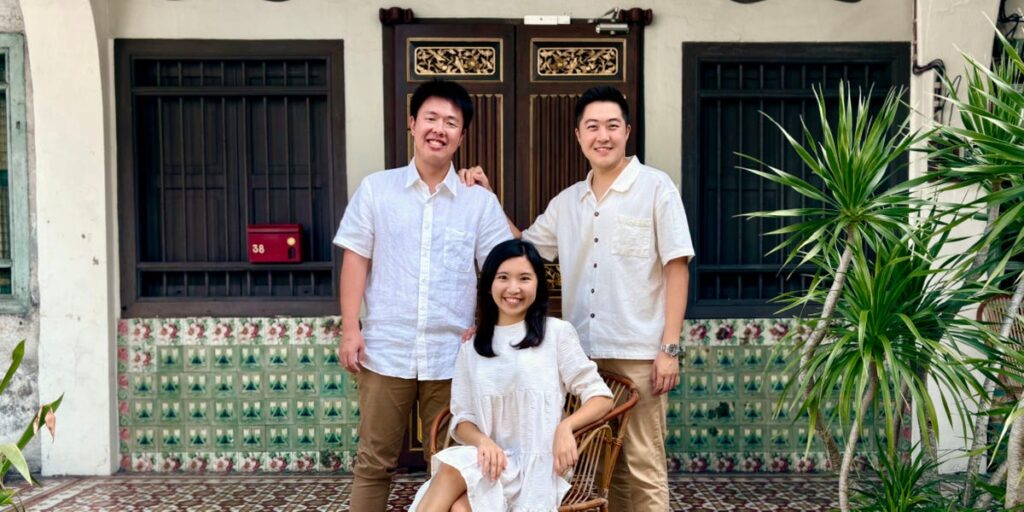The shophouses of Penang, Malaysia, have long been admired from the outside. Shane Low wanted travelers to experience what they’re like inside, too.
He grew up in a family involved in property development and was inspired by how countries like Japan had reimagined traditional homes into guest accommodations.
He’s now doing the same in Penang’s George Town — a UNESCO World Heritage site since 2008.
In 2023, Low started Aayu Homes, a property management company, with his wife, Chong Xin Pei, an architect. His childhood friend, Andy Ooi, joined the company a year later and oversees daily operations and business development.
“We felt that whenever you travel, staying in something very local is more authentic than staying in high-end hotels,” Low, 33, told Business Insider.
Low said he hopes that Aayu Homes can make heritage living more accessible to travelers who want an authentic experience.
Nightly rates for a room in one of their guesthouses range between 125 and 200 Malaysian ringgit, or about $30 and $50, while full homes start from 500 ringgit.
Managing the business
The company manages 15 listings.
“We don’t own any properties; our model is asset-light,” Low said. Instead, Aayu Homes either rents the shophouses or partners with owners and investors through management agreements to run them.
Most properties need little work — just two months of renovations — and the company aims to break even within six months.
Many owners are locals or foreigners living elsewhere who buy shophouses as future homes, often for retirement. In the meantime, they rent them out, but keep the flexibility to stay there whenever they’re in town, he said.
“In terms of our portfolio for the rentals and the ones from investors or individual owners, it’s actually 50-50,” Low said.
For the rental model, the company leases shophouses and uses its own capital for renovations, Low said.
Under the management agreement model, they pitch ideas for how the space could be used, get owners on board, and have them cover the renovation costs.
The biggest design challenge is working with the existing structure without making major alterations, Chong, 33, told Business Insider.
“Every shophouse is different — some are narrower, some have lower ceilings, some come with little backyards. There’s no one-size-fits-all solution for these houses, so each space requires its own design approach,” she said.
In terms of interior design, Low says they like to keep things simple, with a warm color palette that makes the spaces feel inviting.
“We don’t want to overdo stuff,” he said. “We want them to feel calm when they enter the house.”
Low says they typically take around 30% of the revenue.
‘Not for everyone’
The rows of historic shophouses in George Town, dating back to the 1790s and blending Chinese, Malay, Indian, and colonial influences, played a big role in its designation as a UNESCO World Heritage Site.
Today, those shophouses, alongside Penang’s food and cultural heritage, remain key to its tourism appeal. In 2024, Penang received 8.23 million hotel guests, up from 7.27 million the previous year, per data from the Malaysian Tourism Board.
Couples make up the bulk of Aayu Homes’ bookings, Low said. Families also stay with them, typically renting entire houses. Most visitors tend to be European travelers, he added.
Aayu Homes is now a team of 15, including guest assistants and housekeepers.
Working together has come easily for the trio, thanks to their long friendship and complementary strengths, Ooi, 33, told Business Insider.
“Of course, being the third wheel in a business marriage has its perks — I get double the ideas and only half the arguments,” Ooi said.
As for what it’s like to work with her husband, Chong says their dynamic comes naturally, mostly because their roles within the company are clearly defined.
“Each of us has the final say within our own scope, so this minimizes any potential conflict,” Chong said.
Aayu’s homes are listed on Airbnb and Booking.com, where they average 4.9 and 9.5 stars, respectively, with thousands of reviews.
However, there are still occasions when the stay doesn’t align with a guest’s expectations. Low said.
Because of the long floor plans, some rooms don’t have windows, and the old structures also mean sound insulation isn’t perfect, Low said.
“Heritage houses are not for everyone. And for some people, it’s just a product mismatch,” he said.
Looking to the future
Beyond adding more houses, Low says the company is focused on curating experiences that connect guests with Penang’s local culture.
Guests can book cooking classes and heritage walks, or shop at a small store in one of the shophouses that sells local pottery and running gear.
“It becomes a whole ecosystem. Not only do you have houses — you have everything that is local around, from experiences, to products, and shops,” Low said. “At the end of the day, it’s to enhance the experience of our customers.”
Do you have a story to share about building an Airbnb or your dream home in Asia? Contact this reporter at [email protected].
Read the full article here
















